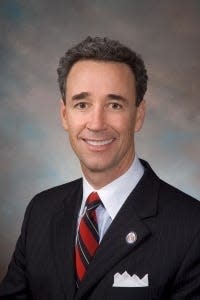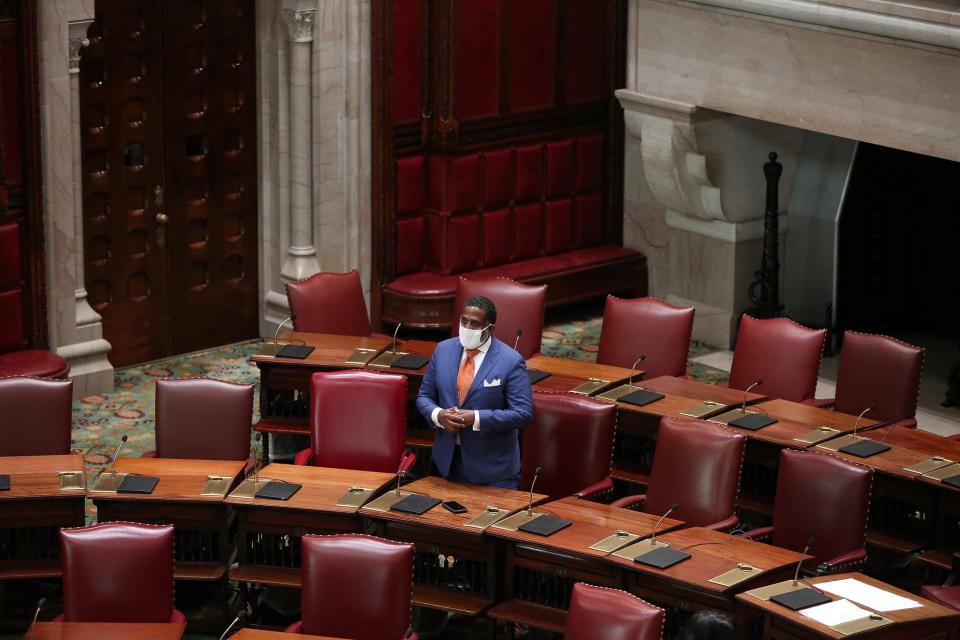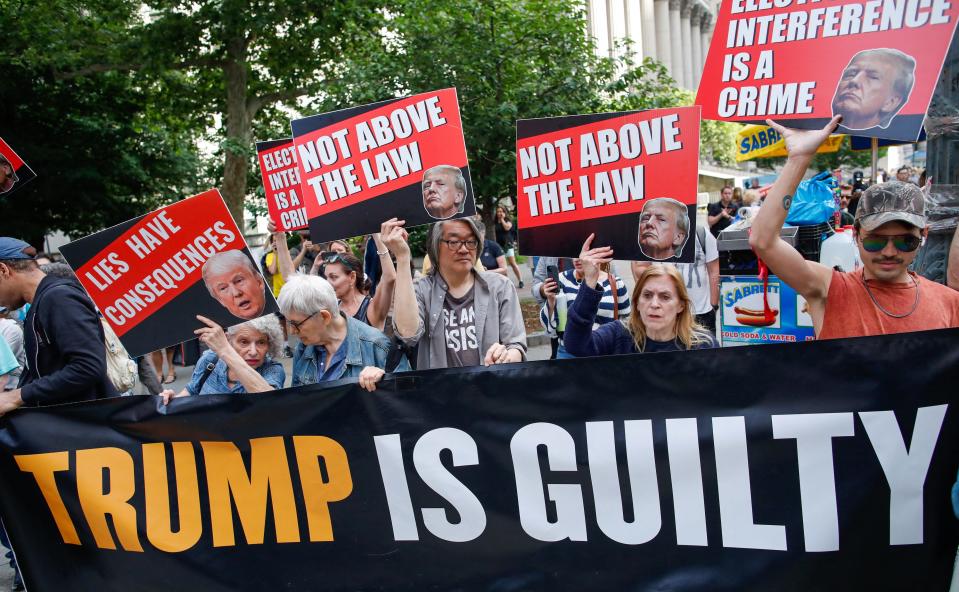Will Donald Trump join Marion Barry and Greg Gianforte by winning race after conviction?
WASHINGTON — Former President Donald Trump could join the growing list of politicians who have been elected after being convicted of crimes.
Trump, the presumptive Republican nominee who was found guilty on 34 felony counts for falsifying business records to hide a hush money payment made to porn star Stormy Daniels, is neck-in-neck or in some cases leading by small margins in national polls against President Joe Biden.
If the former president reclaims the White House in November, he’ll follow the likes of Marion Barry, a Democrat and former D.C. mayor who served six months in federal prison for drug charges before returning to office and Republican Montana Gov. Greg Gianforte, who pleaded guilty to assault, among many others.
"It remains a major problem with our democracy that one can be convicted of a crime – and even be in prison – and win reelection," said David Greenberg, a history professor at Rutgers University. "The White House and Congress were remiss in not passing legislation to address this problem in the last four years."
"It’s important to realize that most of us – no matter our party, no matter our ideology – tend to be forgiving of crimes, scandals, and wrongdoing when committed by a politician we admire for personal or political reasons," he added.
Here’s a list of some officeholders who have been found guilty of charges but still won office after.
Marion Barry
Barry was first elected mayor of Washington, D.C., in 1978. He was still serving as mayor in 1990 when he was arrested for smoking crack cocaine in a room at the Vista International Hotel with a friend who worked as an informant for the FBI and D.C. police.
He was sentenced to six months in federal prison and ordered to pay a $5,000 fine. After being released from prison, he was elected to the city council in D.C. in 1992 and won a fourth term as mayor in 1994. He died at the age of 78 in 2014.
"There is no discounting people's loyalty to a long-time elected official that is revered in their community," said Wesley Leckrone, chair of political science at Widener University. "Years, or even decades, of helping constituents and being viewed as someone who stands up for their community creates a commitment to a candidate. Former D.C. Mayor Marion Barry is a prime example."
"He was seen as pillar of the Black community, a person that stood up for the interests of the poor. In many sections of D.C., constituents believed that he was being framed because of his race. Consequently, he was able to come back after conviction. It also helps when someone represents a one-party, solid blue or red constituency," Leckrone added.
Greg Gianforte
Gianforte pleaded guilty to a misdemeanor charge in 2017 after assaulting a reporter on the eve of his election to the House of Representatives. Ben Jacobs, the reporter for the Guardian at the time, said Gianforte body slammed him at a campaign event breaking his glasses. The event was captured with audio recordings and Fox News reporters said they saw Gianforte body slam Jacobs and proceed to punch him.
Gianforte apologized to Jacobs. The Montana Republican was sentenced to 40 hours of community service and 20 hours of anger management classes. Gianforte was elected to the House, where he served from 2017 to 2021. He’s served as Montana’s governor since 2021.

Joseph Morrissey
Joseph Morrissey, a Virginia independent lawmaker, was re-elected in 2015 to the state’s House of Delegates while serving a six-month jail sentence, according to CNN.
He pleaded guilty to a misdemeanor charge just a month before the election for an alleged sexual relationship with a 17-year-old underage secretary, the outlet reported. Morrissey campaigned during the day and spent the night behind bars.

Kevin Parker
Democratic New York State Senator Kevin Parker was convicted of misdemeanor criminal mischief charges in 2010 after he allegedly confronted a photographer for the New York Post and damaged the reporter’s equipment.
Parker has had other run-ins with the law. In 2005, during his first term, he was charged with assault for punching a traffic agent who gave him a ticket for double-parking. Also in 2005, a former aide accused Parker of threatening her after she publicly complained that he shoved and hit her.
Last year, a lawsuit was filed against Parker accusing him of rape.
Despite his conviction, he’s kept his seat in the state Senate. He has been reelected every two years since and he is running for re-election in 2024.
Vito Fossella
Vito Fossella, a Republican, was serving in the House representing New York’s 13th Congressional District when he was arrested for drunk driving in May 2008. He later admitted to having fathered a child through an affair and abandoned his re-election bid, citing the “need to concentrate on healing the wounds that I have caused to my wife and family."
In October 2008, Fossella was found guilty of a misdemeanor charge for drunk driving. He was sentenced to five days in prison. Despite his sentence, he still was elected to be Staten Island borough president in 2021.
Matthew Lyon
During the Quasi War with France, Matthew Lyon, who represented Vermont in the House, published editorials criticizing President John Adams. He was found guilty of violating the Alien and Sedition Acts in 1798, Greenberg said. Lyon was jailed, ran for Congress and was re-elected to the House that same year.
He won re-election to the House in 1802, representing Kentucky. Afterwards, he won re-election three more times until 1810, where he was defeated in part because of his opposition to the War of 1812, according to the Encyclopedia of Arkansas.
How about lawmakers facing indictment or investigation who were re-elected?
Along with lawmakers who were convicted, there are also lawmakers who were indicted or were involved in an investigation that took office.
For instance, Democrat John Street, the former mayor of Philadelphia who was elected to his first term beginning in 2000, was the subject of a federal corruption investigation. But he was still re-elected to a second term that started in 2004.
Likewise, former Rep. Michael Grimm, R-N.Y., who served in the House from 2011 to 2015, was indicted in 2014 for mail, wire and health care fraud, filing false tax returns, perjury, obstruction of an official proceeding and other charges. Despite the charges, he won re-election in 2014 but later resigned in December that same year after pleading guilty to a tax evasion charge.
More recently, former Reps. Chris Collins, R-N.Y., and Duncan Hunter, R-Calif., who were both facing federal indictments, were re-elected to the House during the 2018 midterm elections. Collins resigned in 2019 ahead of a guilty plea on criminal insider trading charges and Hunter resigned after pleading guilty to a conspiracy to misuse campaign funds.
There are also lawmakers currently facing indictments who are running in the general election. For example, Bob Menendez, New Jersey's senior senator who is on trial in lower Manhattan on federal corruption charges, is running for re-election as an independent candidate.

Will Trump join this list of lawmakers?
Whether Trump's conviction will harm his re-election bid depends on the mood of the voters. Some polls indicate that voter's views are mostly unchanged and along partly lines.
"American politics today has really reverted to its historical norm, the kind of polarization that characterized it from its founding until the Cold War, really, where you have two sides that are deeply entrenched and move further and further apart from each other on key philosophical issues," said Matthew Schmidt, University of New Haven associate professor of national security and political science.
A CBS poll conducted between May 30 and June 1 found that 82% of Republicans think the jury reached the wrong verdict in Trump's trial while 96% of Democrats think they reached the right verdict. The same poll found 81% of Republicans think Trump is fit to be president while only 2% of Democrats think he is.
An ABC News/Ipsos poll conducted between May 31 and June 1 found that Trump’s favorability hasn’t changed much since his conviction. Some 31% of survey respondents had a favorable opinion of Trump, a slight uptick from 29% in a March poll. President Joe Biden’s favorability is in that same range, the poll found, with 32% favorability now compared with 33% in March.
"When he finds himself in legal trouble, he claims that it is political persecution," Leckrone said, referring to Trump. "His supporters believe this because they buy the narrative that 'the establishment' is trying to bring him down since he's challenging them... His core constituency appreciates this sentiment and it actually endears him to them even more."
This article originally appeared on USA TODAY: Will Trump join growing list of politicians elected after conviction?
